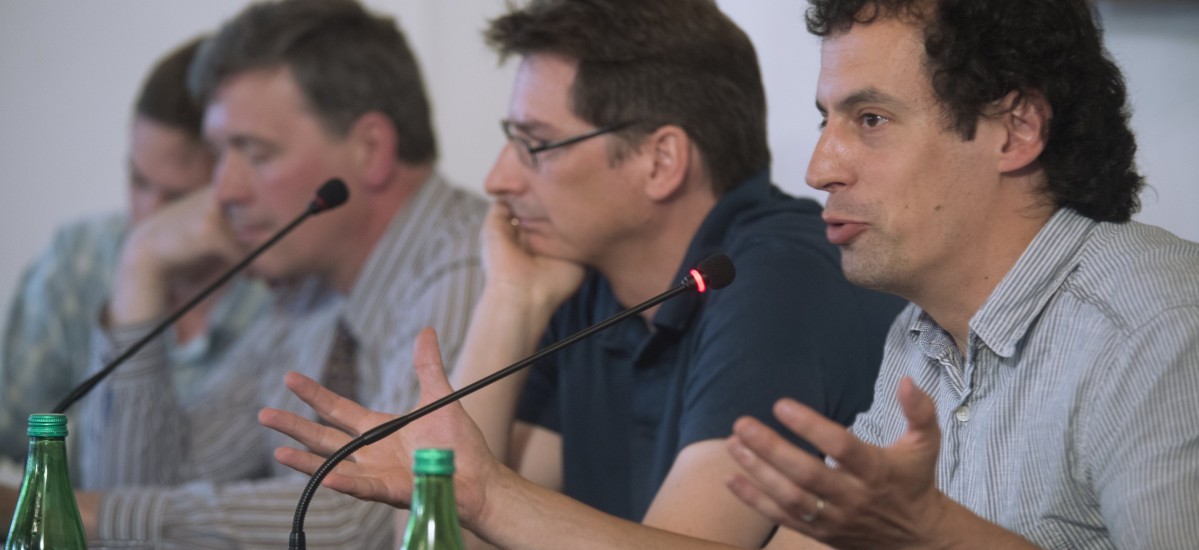
The second day of the Visegrad Summer School was devoted to the general conceptualisation of the Central Europe. While, during the third day the participants were invited for a journey throughout the ages.
It began with Martin Ehl’s provocative comparative analysis of the Central and Eastern European history. “My hero, your enemy - my victory, your loss” was the central idea of the proposed case study that was to present several historical events or personages that perception differs in our countries. Martin Ehl argued that in order to communicate and cooperate effectively we have to try to understand our past and its diverse interpretations. Otherwise, we might become victims of populists who try to use history as a tool of exclusion. This lead to a few ideas. For instance the common Visegrad history textbook that would aim at presenting the past of the region with all its complications and twists. As Marek Slobodnik from Slovakia highlighted this would demand a profound change of the way history is taught and causes certain threats such as selectivity and dominance of narratives over facts.
Martin Ehl’s presentation raised many doubts or controversies. To Florin Rugina, the Romanian participant it was too simplifying. Also Miklós Mátéka and Tomáš Kolár prefer a more careful approach to history. They questioned the relevancy of facts selected arbitrarily by Martin Ehl. However, Veronika Tomanová from the Czech Republic sees it as inspiring provocation that can make people thinking about the history in a new way.
This definitely refers to the second lecture of the day as well. Barbara Törnquist-Plewa focused on the common identities’ construction in the Central and Eastern Europe. As long identity remains either a matter of constant choices and some independent circumstances – it demands a careful consideration. There are some elements that Barbara Törnquist-Plewa sees as essential parts of the Central European identity.
Firstly, she likes the idea of that region as “a postmodern landscape” were monsters or dogmas of modernity have already been deconstructed. This also means a specifically critical approach to certain aspects of “the Western progress”. Those intuitions can be found in the works of Czesław Miłosz, Václav Havel and even outside the area, e.g.:Claudio Magris.
Indeed, that East-West opposition is one of the most fruitful when it comes to identities creation in our region. Thus, we have all those clichés of: poverty vs prosperity, spirituality vs materialism, disorder vs order – or finally the image of backward half-barbarian Eastern peripheries and enlightened Western centre.
For Barbara Törnquist-Plewa this implies a certain and ambitious task that could be expressed in the famous phrase of “New Europe”. Nevertheless, she did not recall the term coined by the American policymakers at the beginning of the 21st century. New Europe means an Old Continent refreshed and re-united after the end of communist oppression.
Such inspiring and motivating aspect of history emerged also during the third panel of the day conducted by Wojciech Przybylski, editor in chief of the Visegrad Insight journal. Are we the prisoners of the past? That was the initial question that the panellists had to deal with.
From the very beginning a consensus has been reached that a history is rather a merely selective narrative than facts. As a result, what we’re used to term as history is rather a kind of mythology based on arbitrarily chosen events. Hence, for Aleksander Kaczorowski the notion of Central Europe is an artificial construction that no longer has a meaningful content. He’d rather look for some more broad community that would not exclude e.g. Bulgarians, Ukrainians or Romanians. “We are all the grandchildren of slaves” – he claimed. Our common goal should be to overcome our seemingly eternal peripheral character. On the other hand, Petr Roubal would rather focus on interconnection between the Central and Eastern European countries. As he mentioned – it’s easier, quicker and sometimes cheaper to get from Prague to London than to Kraków. Therefore, we all share some bitter experiences of the past that we want to escape from. That somehow correspond with the philosophical remarks made by Balázs Sárvári from Hungary– the brave voluntarily participant of the panel. According to his statement, people in the prison are fortunate because they’re truly conscious of their imprisonment. Therefore they can get and appreciate the real meaning of freedom. To Abraham Samuel we somehow suffer from too much idealistic imaginations on the nature of a liberal democracy. The politics of a stable country is not a matter of “truth-tellers” such as the former dissidents. As he paraphrased Hannah Arendt: “the essence of power is to be deceitful while the essence of truth to be impotent”. Hence, the only way to secure a just order of a state is to establish strong institutions to defend the impotent values (“the power of the powerless” as Václav Havel would put it) against the deceitful and merciless authority. According to Abraham, these are: academia, free media and an independent judiciary. Therefore, the imponderable values have to be guarded by a very practical or even tangible institutions – which are to be discussed during the coming days of the 12. Visegrad Summer School.
Ziemowit Jóźwik













